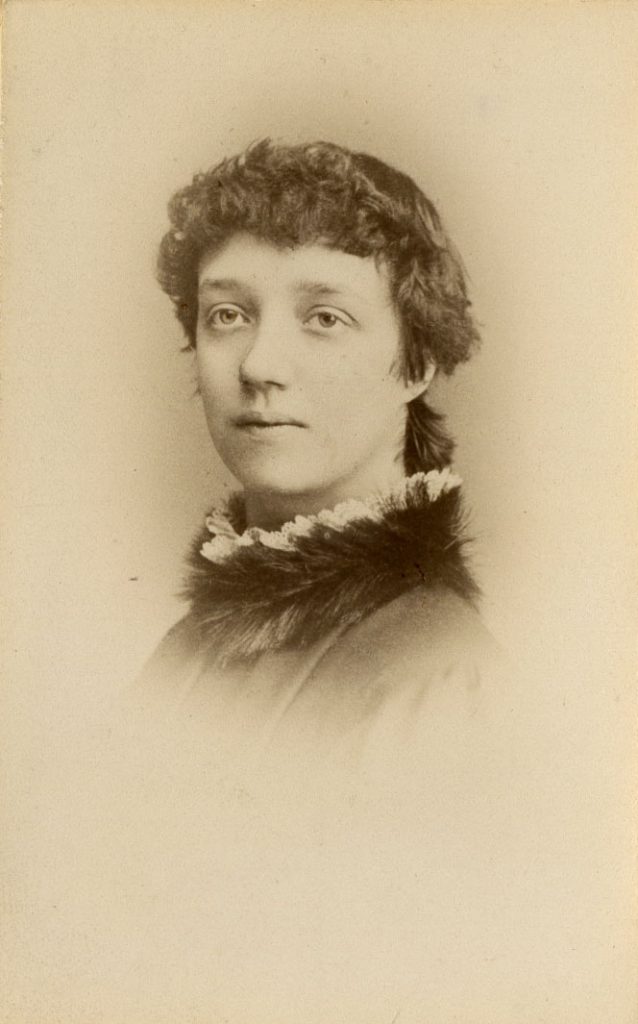A liberal start
The house she grew up in was fairly liberal and her father’s interests in the natural world, anthropology and the arts undoubtedly left an impression on Annie. When young she had heard her father’s support for Jacob Bright, a liberal who was promoting a Parliamentary Bill that would give women the vote and, according to author Shelia Gooddie, Annie “resolved that one day she would have the vote.”
Annie was in a privileged position. The family business and the progressive attitude of the Horniman family meant that she was able to enroll in the Slade School of Art when she was 22 in 1882, along with her brother Emslie, who was 19.

Annie Horniman
It was the first fine art school to open its doors to both sexes and Slade allowed Annie Horniman an element of freedom. She cut her long hair short, smoked in public, and (according to Gooddie) may have entered into a romantic relationship with her friend, Mina Bergson.
On her bike
Annie also discovered the bicycle during this time. It was an important mode of transport for women, granting them a level of independence, if they could afford one. The American suffragette Susan B Anthony said, ”I think [the bicycle] has done more to emancipate women than anything else in the world.’’
Annie preferred the men’s bikes over the ladies cycles according to Gooddie, saying “ladies bicycles are mere hen-roosts – the gears are so low that any serious traveling on them is ridiculous.” Her actions provoked mockery and anger from men. Unsurprising, when the ladies bikes of the day were lambasted for showing ankles and bloomers.
She remained undaunted. When Annie grew tired of hearing insults about her legs she started wearing trousers, which did not become commonplace in the UK until the early 20th century. Her bicycle opened up the world of London and surrounding counties to Annie, and she didn’t stop there. She also took her bike around Europe, journeying twice over the Alps. Her love of cycling didn’t diminish as she grew older.
When she bought her apartment in London’s Portman Square she would carry the bicycle up three flights of stairs.
An artistic set
Her admission to Slade included a reader’s ticket to the British Museum and it was while she was studying art in the reading room, that she met several important figures, including George Bernard Shaw, WB Yeats and Florence Farr. She joined the Hermetic Order of the Golden Dawn with them in 1890, an occult society that admitted both men and women.
Their friendships would prove important for all parties. Annie financed Farr’s first venture as a director, as well as the first plays by Yeats and Shaw. She did so anonymously as, despite their liberal leanings, the Horniman family did not approve of the theatre. It was because of a legacy from her uncle that she was able to try her hand at theatre management.
In 1894 she anonymously backed the first public performances of Shaw’s ‘Arms and the Man’ and Yeats’ ‘The Land of Heart’s Desire’.
Annie worked with Yeats for years and established the Abbey Theatre in Dublin with him, running the financial and business side until she cut her ties in 1910 after a falling out with Yeats. However, she is remembered by many for her role in developing the first regional repertory theatre company in Britain at the Gaiety Theatre in Manchester. She bought the theatre with actor Ben Iden Payne and attracted stars of the time such as Sybil Thorndike.
A supporter of suffrage
Harking back perhaps to some of those earlier conversations overheard in Forest Hill, Annie supported the suffrage movement.
Annie spoke at numerous meetings. At a meeting of suffragettes in the Free Trade Hall in Manchester, Annie had been on the platform. She had spoken in London at the Queen’s Hall. She helped to raise funds for a new Women’s Union Building for Manchester University, by holding a special matinee performance at the Gaiety Theatre. The aim was to provide facilities for use by both sexes.
Her work was recognised by Emmeline Pankhurst, who told Annie, “You have done so much for dramatic art in this country that you have won our gratitude. It is an added pleasure to me that you are a woman”.
Annie thought the best way to prove the quality of the sexes was for women to show by their own achievements that they could do as well and better than men. And the money she inherited enabled her to do this, an avenue which was not available to most women.
Annie was made a Companion of Honour a few years before she died in 1937 at her home in Shere, Surrey.
If you are interested in learning more about Annie Horniman you can:
- Read Shelia Gooddie, Annie Horniman: A Pioneer in the Theatre
- Explore her archive at The University of Manchester Library
- Read BBC Manchester History article: Annie Horniman
- Read Annie Horniman: Rebel with a Cause by Sharon O’Connor



